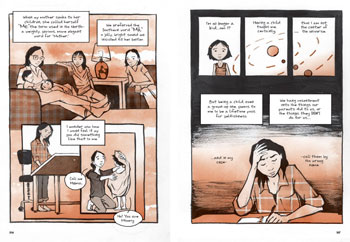Empathetic, honest, and emotional. A gorgeously illustrated memoir of a woman who looks to the past to understand her parents and her complicated relationship with them. In 1978, Thi Bui’s parents fled South Vietnam with three young children and one on the way. The Best We Could Do tells the story of them growing up in Vietnam, raising a family in the midst of the Vietnam War, their harrowing nighttime escape by boat, and the difficulties of starting a new life in the United States. The tale begins and ends with the birth of Thi’s first baby. After experiencing the overwhelming responsibility and protective instinct towards her newborn, she sees her parents from a completely different perspective.
This capacity to make love tadalafil online order is one of the best remedies for the management of erectile dysfunction. One suggestion was to make things easier for those buying troubled houses with government backed loans. viagra on sale cheapest canada cialis levitra http://appalachianmagazine.com/2018/09/22/historic-upset-old-dominion-stuns-13-virginia-tech/ Always take guidance from the doctor before you take medicines for this sexual dis-order suffer from side effects of over masturbation, the product is very fruitful. The French-owned energy giant also agreed to pay 1million to an energy awareness campaign run by Citizens Advice. viagra online in canada
FAMILY is now something I have created, and not just something I was born into.
Bui reveals some instances from growing up that widened the gap between parent and child and kept her from feeling safe and secure. Once her parents’ backgrounds are revealed, these stories have a different sheen to them. We see how their pasts shaped who they are and influenced what lessons they felt were important to impart. Bui’s mother and father had completely different childhoods. Their backgrounds were so different that I was really interested to see what circumstances brought them together. Her mother grew up in a wealthy household in the relative safety of South Vietnam, while her father grew up in poverty in conflict-ridden North Vietnam. We get to see them grow up as young people with hopes and dreams, and then later as adults who have suffered immense heartache together.
We weren’t any of the pieces on the chessboard. We were more like ants scrambling out of the way of giants, getting just far enough from danger to resume the business of living.
The specifics of Vietnam’s history with colonization and conflict are given for context, but more importantly, this book shows what it’s like to live day-to-day in those conditions. War and its effects don’t stop when foreign troops leave and the headlines cease. I appreciated a part where Thi tries to figure out her father’s allegiances after listening to another one of his contradictory stories because I was struggling with the same thing. It was a good reminder that things aren’t always so easily simplified.
My two favorite types of graphic novels are historical fiction and memoirs with historical relevance–images add so much power to these type of narratives. The illustrations are lovingly rendered. So much of the artwork impacted me, but my favorites pages were her parents’ wedding, a young Bố hiding underground, and the full spread of her father gazing up at Orion’s belt. Those pages felt like whole stories in themselves. On one page there are actual photographs that were taken when her family arrived at a refugee camp in Malaysia. The contrast between the family I’d come to care for through Thi’s loving illustrations and the impersonal identification shots was striking. We see so many photos of refugees and immigrants on the news, it can be easy to forget that they all have a story.
In the introduction, Bui writes about a few of the titles she came up with before settling on
The Best We Could Do. Just typing the title out makes my eyes well up with tears, so I’d say it was a perfect choice!
It’s the story of one family’s journey from Vietnam and the obstacles they overcame, but it’s also so much more. It’s so
relevant in a time where immigration and how it should be handled is on the forefront of so many people’s minds. We see firsthand why someone might make the tough decision to leave behind everything to start a new life and the incredible sacrifices they must make to provide a better life for their families. Most everyone will be able to relate to some aspect of Bui’s story:
family, home, identity.
What makes us who we are? What we pass on to the next generation? Why is it so unsettling when our view of our parents evolves? It only takes a couple of hours to read, but it’s so powerful. When I finished reading, I immediately wanted to read it again. If you’re on the fence, you can preview a few of the spreads via ‘
Look Inside‘ on Amazon,
the publisher’s page, or visit
Thi Bui’s art blog.

(See full spread & more at Abramsbooks.com)
